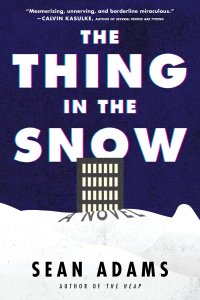Paul Di Filippo Reviews The Thing in the Snow by Sean Adams
 The Thing in the Snow, Sean Adams (Morrow 978-0063257757, hardcover, 288pp, $27.99) January 2023
The Thing in the Snow, Sean Adams (Morrow 978-0063257757, hardcover, 288pp, $27.99) January 2023
An enormous, spooky, half-abandoned, cryptic building, whose inhabitants pursue ceremonies and rituals with unthinking adherence, while menaces hover both within (due to interpersonal conflicts) and also on the perimeters. We must be talking about Peake’s monumental and essential Gormenghast series, right? Not at all. Instead we are concerned with Sean Adams’s second novel, The Thing in the Snow, which likewise fits my description, give or take a few sanded-down edges. While I have not been so fortunate yet as to read his debut, The Heap, I discern from online sources that it too concerned a vast ruined building with a bevy of quirky residents and affiliates, in a somewhat Ballardian manner (High Rise). But far from merely repeating himself, I believe that Adams is using these motifs with variations, like a musical composer, to dig into twenty-first century (but really, timeless and eternal) issues of alienation, deracination, self-hood and community.
I should mention that one way this book hews to Peake’s methodology is that nothing overtly supernatural or contrary to physics occurs herein, and yet the whole production is undeniably New Weird at the very least, making it part and parcel of our wide-open church of fantastika.
In the polar wastes (presumably the Arctic) lies the aforementioned huge structure dubbed the Northern Institute. Currently occupied by three official employees and one unauthorized fellow, it was once a flourishing research center. But all the scientists have been withdrawn, and their projects shelved, at least temporarily. And so Hart (our narrator, the supervisor) and Gibbs, a woman, and Cline, a man, are on duty just to keep the facility half-alive. The one remaining scientist, Gilroy, is elusive and strange, continuing to conduct his cold-based experiments according to bizarre protocols.
The trio receive supplies and directives weekly via a helicopter that lands on the roof. (The building is buried in snow up to its third story.) Their assigned tasks are the essence of make-work futility: testing all the chairs for stability, opening and closing the doors to gauge noisy hinges, etc. There is no audiovideo or internet entertainment, although Hart enjoys reading a series of improbable books involving a professional management guru who doubles as a spy-cum-mercenary-cum-Robin-Hood.
As you might imagine, being underworked in a very cold place with sensory deprivation (they are not allowed out, due to a supposed environmental “sickness”) conjures up strange, fugue-like perceptions (the follicles of Hart’s beard prickle like Spidey Sense), as well as Asperger’s-style behaviors.
Nonetheless, the three—racking up good pay back home—maintain a pretty even keel, until one last destabilizing factor emerges.
Outside in the frozen landscape, an indiscernible Thing emerges. It seems to move around a bit, but never really approaches the Institute. Needless to say, it becomes an idée fixe for everyone, and threatens to destroy the Institute. Can Hart’s managerial skills triumph? What about Gibbs’s writerly descriptive powers? Maybe Cline’s painterly talents? (Although he’s never actually painted anything to date.) Even Gilroy’s prose-poem automatic writing done in total darkness might contribute. The communiques from Kay, their boss back in civilization, however, cause more confusion than otherwise. And when an outsider, the perky and blithe Health Specialist, arrives to conduct the semiannual checkup, might she too fall under the sway of the Thing?
The whole narrative is delivered in Hart’s earnest, kinda naive, deadpan, half-bewildered affect and prose that makes for some excellent humorous reading.
Something to know: It is not required that I, as supervisor, make my office available for coffee and light socialization each weekday morning before work begins. This I do of my own volition, in the spirit of generosity. But Gibbs and Cline don’t seem to realize this. Perhaps, if I’d wanted recognition, I should not have opened my office for coffee and light socialization on our first day here. Perhaps I should’ve waited a week or two and then said, “Hey, how about I open my office each morning for some coffee and light socialization?” Or maybe just “Hey, how about I open my office each morning for some coffee?” as the outright mention of light socialization might create an atmosphere that is neither light nor particularly social.
Nonetheless Hart emerges not as a figure of ridicule somehow, but as a heroic champion, struggling with his limited skillset to do the Right Thing.
The mere mention of a “thing” in the Arctic of course conjures up John Campbell’s famous monster, and I think Adams knows this and plays deliberately off the classic work, replacing JWC’s real menace with a kind of bland, somehow corporate non-menace. And that’s a key to the lineage of this book. It’s in direct line of descent from Heller’s Catch-22 and, more viscerally, Something Happened. It’s Sladek’s “Masterson and the Clerks”, Disch’s “Descending” and “The Squirrel Cage”, and even Melville’s “Bartleby, the Scrivener”. Toss in the flavorings of Ballard and Peake, as cited earlier, and you have a quintessential fantastical examination and dissection of the postmodern “bullshit jobs” ecosystem, as described by anthropologist David Graeber.
Adams delivers a resonant ending which does not deny the madness and futility of all that preceded it, and yet is somehow redemptive and recuperative for everyone, with a literal deus ex-helicopter. Yes, the book affirms, life might be just one stupid repetitive thing after another, but we can salvage moments of grace with the right attitude, and the help of our equally damaged and despairing yet valiant comrades.
 While you are here, please take a moment to support Locus with a one-time or recurring donation. We rely on reader donations to keep the magazine and site going, and would like to keep the site paywall free, but WE NEED YOUR FINANCIAL SUPPORT to continue quality coverage of the science fiction and fantasy field.
While you are here, please take a moment to support Locus with a one-time or recurring donation. We rely on reader donations to keep the magazine and site going, and would like to keep the site paywall free, but WE NEED YOUR FINANCIAL SUPPORT to continue quality coverage of the science fiction and fantasy field.
©Locus Magazine. Copyrighted material may not be republished without permission of LSFF






